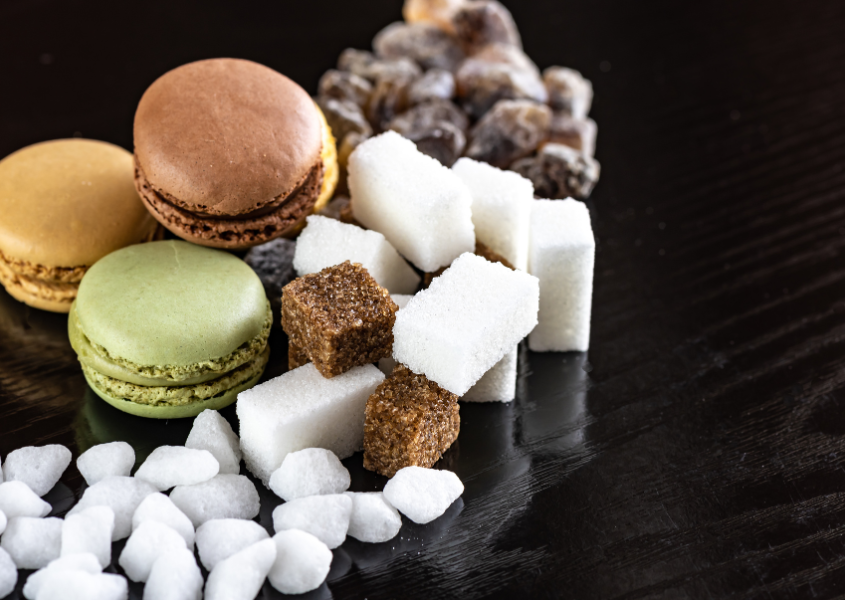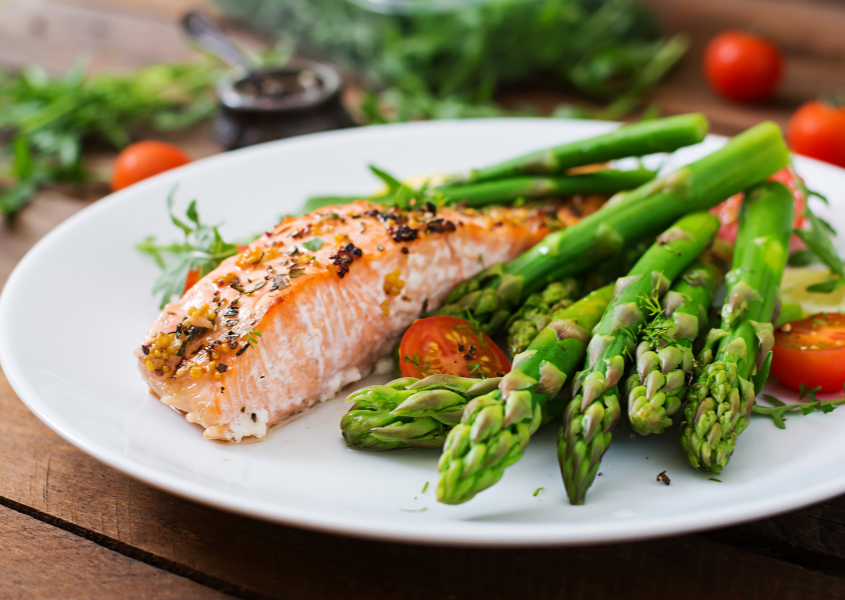


No Sugar No Flour Diet is sometimes referred to as a way of eating without sugar and flour from the diet to lose weight and improve health. Many people say that this way of eating can help you burn fat and feel better overall. When you don’t eat sugar or flour in your diet, it can help control your blood sugar and reduce cravings.
Key Takeaways
- No Sugar No Flour Diet is a diet that eliminates sugar and flour to promote weight loss and improve health by focusing on whole, minimally processed foods.
- Its benefits include weight loss, improved metabolic health, reduced inflammation, lower risk of chronic diseases, and improved mood and energy levels.
- Plan meals with whole foods, cook at home, stay hydrated, monitor progress, and snack wisely.
- Strategies to overcome challenges like cravings, social pressure, limited food options, lack of convenience, and weight loss stalls when following a no-sugar, no-flour diet.
- Differentiating between natural sugars found in whole foods and added sugars in processed foods is crucial for making healthier dietary choices.
What Is A No Sugar No Flour Diet?
A no flour no added sugar diet eliminates foods with added or refined carbs, sugars, olive oil, and flour. It was created by Dr. Peter Gott and aims to combat with weight gain and health issues. The key principles of a no flour no added sugar diet involve avoiding foods with added sugars and refined flour. Instead, focus on whole grains, lean proteins, fruits, and vegetables.
A no sugar no flour diet reduces the consumption of foods with added sugars and refined flour. It promotes whole, minimally processed foods to improve health, manage weight, and reduce the risk of chronic disease.
Benefits Of A No Sugar No Flour Diet
The benefits of a no flour no sugar diet include weight loss, improved blood sugar control, increased energy levels, reduced inflammation, better digestion, and lower risk of chronic diseases such as diabetes and heart disease, etc. Here are these benefits:
1. Weight Loss and Improved Metabolic Health
One of the most significant health benefits because of a no flour no sugar diet is weight loss and improved metabolic health. Foods that contain added sugars are often high in calories and low in essential nutrients themselves, making them a common culprit in weight gain and metabolic disorders.
By eliminating these foods from the diet, individuals can reduce their caloric intake and improve their metabolic health. Additionally, a no-sugar diet can help prevent or manage conditions such as diabetes, heart disease, and stroke. By cutting out sugar and processed carbs, individuals can jump-start their weight loss and improve their overall health and well-being.
2. Reduce Inflammation And Risk of Chronic Diseases
Another advantage of a no flour no sugar diet plan is reduced inflammation and lower risk of chronic diseases. Sugar is known to increase the risk of obesity which in turn increases the risk of chronic diseases such as cancer, heart disease, and diabetes. By eliminating sugar from the diet, individuals can reduce inflammation and improve their overall health. Eating whole, unprocessed foods such as fruits, vegetables, whole grains, legumes, and fish can help fight inflammation and reduce the risk of chronic diseases.
3. Improve Mood and Energy Levels
A no flour no sugar diet can also improve mood and energy levels. Sugar and refined carbohydrates can cause spikes in blood sugar levels, leading to energy crashes and mood swings. By eliminating these foods from the diet, individuals can stabilize their blood sugar levels and improve their overall energy and mood. Additionally, a low-sugar diet can reduce hunger pangs and cravings, boost mental clarity, and improve overall well-being.
How To Start A No Sugar No Flour Diet and Meal Plans
To start a no flour no sugar diet, follow the sugar diet book in these steps:
- Plan Your Meals: Plan your meals for the week, incorporating whole foods like lean protein, vegetables, fruits, nuts, seeds, and whole grains such as quinoa and brown rice. This not only simplifies grocery shopping but also facilitates meal prep.
- Don’t Skip Breakfast: Opt for light foods such as whole grain cereal, almond milk, and plant-based yogurts. Get inspired by our 15 delicious low-carb breakfast ideas.
- Cook at Home: Prepare your meals at home to have better control over the ingredients and avoid hidden sugars and flours in restaurant dishes. Avoid processed and packaged foods available in grocery stores, such as chicken nuggets, crab cakes, flavored sausages, or breaded fish sticks. They are usually very rich in sugar.
- Stay Hydrated: Drink plenty of water throughout the day to help curb cravings and support overall health. Avoid concentrated fruit juice as it contains a lot of sugar.
- Monitor Your Progress: Keep track of your weight, energy levels, and any changes in health as you progress through the diet.
- Snack Smart: Opt for snacks like fresh fruits, fruit, nuts, Greek yogurt, or veggie sticks with hummus to keep you satisfied between meals.
- Find Support: Consider joining a support group or online community to connect with others following a similar diet. Sharing experiences and tips can help keep you motivated.
Remember, before starting any new diet or making significant changes to your eating habits, it’s always a good idea to consult with a healthcare professional or a nutritionist to ensure it’s right for you. Good luck on your no flour nonfat milk, almond, or soy milk no, no soy milk no sugar journey!
Potential Challenges And How To Overcome Them
When starting a no flour no sugar diet, you may encounter various challenges. Here are some common obstacles and strategies to overcome them:
1. Cravings and Withdrawal Symptoms
Challenge: You may experience cravings for sugary and starchy foods initially as your body adjusts to the new diet.
How to overcome: Gradually reduce sugar and flour intake instead of quitting cold turkey. Keep healthy snacks on hand to curb cravings, such as fruit, nuts, or veggies. Stay hydrated and get plenty of rest to help manage withdrawal symptoms.
2. Social Pressure
Challenge: Attending social gatherings or events where unhealthy foods are prevalent can make it challenging to stick to the diet.
How to overcome: Communicate your dietary needs with friends and family so they can offer support. Offer to bring a dish to share that aligns with your diet restrictions. Focus on socializing rather than just food, and find other ways to enjoy the event.
3. Limited Food Options
Challenge: It may seem difficult to find satisfying meals and snacks that don’t contain flour or sugar.
How to overcome: Experiment with new recipes and ingredients to keep your meals interesting. Explore different types of whole grains like quinoa, brown rice, and oats. Plan your meals ahead of time to ensure you have the necessary ingredients on hand.
4. Lack of Convenience
Challenge: Convenience foods like fast food and pre-packaged snacks often contain flour and sugar, making it harder to stay on track.
How to overcome: Prepare and batch-cook meals in advance to have more healthy food options readily available. Keep quick and easy snacks on hand, such as pre-cut veggies, hard-boiled eggs, or Greek yogurt.
5. Plateau or Weight Loss Stalls
Challenge: Your weight loss progress may stall after some time on the diet, leading to frustration.
How to overcome: Reassess your portion sizes and overall caloric intake to ensure you’re still in a calorie deficit. Incorporate regular physical activity to boost metabolism and burn more calories. Consult with a healthcare professional or dietitian for personalized advice.
By being aware of these potential challenges and implementing strategies to overcome them, you can increase your chances of success on a no flour no sugar diet. Remember to be patient with yourself and stay committed to your health goals.
Natural Sugars and Processed Foods

Understanding the sources of natural sugar in your diet is crucial in differentiating between natural sugars and processed foods and their impact on your health. Here are some important points to consider regarding natural sugar:
Natural Sugars
Natural sugars are found in whole, unprocessed foods such as fruits, vegetables, dairy products, and some grains. These sugars are accompanied by other nutrients like fiber, vitamins, and minerals, which help slow down the absorption of sugar into the bloodstream. Examples of foods containing natural sugars include apples, bananas, carrots, and milk.
Processed Foods
Processed foods, on the other hand, often contain added sugars that are not naturally present in the ingredients. These added sugars can be in the form of sucrose, high-fructose corn syrup, or other sweeteners. Processed foods high in added sugars include sodas, candies, pastries, cereals, and many packaged snacks.
Health Impacts
Consuming too much added sugars from processed foods can lead to various health issues such as weight gain, increased risk of type 2 diabetes, cardiovascular disease, and dental problems. On the other hand, natural sugars from whole foods are generally considered healthier options due to their nutrient content and the way they are metabolized in the body.
While natural sugars are a better choice than added sugars, it’s still important to consume them in moderation as part of a balanced diet. Fruits, for example, are nutritious sources of natural sugars but should be eaten as part of a diverse range of foods to ensure you’re meeting all your nutritional needs.
Sample No-Sugar No-Flour Recipes
Here are sample recipes that are all gluten-free because of both sugar and flour:
Baked Salmon with Roasted Vegetables

Ingredients:
- 4 salmon fillets
- 2 tbsp olive oil
- Salt and pepper to taste
- 1 cup broccoli florets
- 1 cup cauliflower florets
- 1 cup sliced carrots
- 1 cup sliced bell peppers
Instructions:
- Preheat the oven to 400°F (200°C).
- Place the salmon fillets on a baking sheet lined with parchment paper.
- Drizzle olive oil over the salmon and season with salt and pepper.
- In a separate bowl, toss the vegetables with olive oil, salt, and pepper.
- Spread the vegetables evenly on another baking sheet.
- Place both baking sheets in the preheated oven and bake for 15-20 minutes or until the salmon is cooked through and the vegetables are tender.
- Serve the baked salmon alongside the roasted vegetables.
Remember to adjust these recipes based on your personal preference and dietary restrictions. Enjoy the delicious no-sugar no-flour recipe!
Conclusion
In conclusion, the no sugar no flour diet is an effective way to improve health and lose weight. By eliminating sugar and flour from the diet, individuals can experience significant health benefits such as improved metabolic health, reduced inflammation, and lower risk of chronic diseases.
What foods have no sugar and no flour?
What is the no sugar and no flour diet called?
What happens to your body when you stop eating sugar and flour?
Carly Young. No Sugar, No Flour – No Problem! [online]. Available at: https://www.everydayhealth.com/diet-nutrition/no-sugar-no-flour-no-problem/ [Accessed 19 Mar 2024].
Paula Martinac (2019) No-Sugar and No-Flour Diet Food List [online]. Available at: https://www.livestrong.com/article/206285-no-sugar-no-flour-diet-food-list/ [Accessed 19 Mar 2024].
Petter H. Gott. (2011). Dr. Gott: No flour, no sugar questions answered. [online]. Available at: https://www.oklahoman.com/story/lifestyle/2011/10/18/dr-gott-no-flour-no-sugar-questions-answered/61126009007/ [Accessed 19 Mar 2024].





